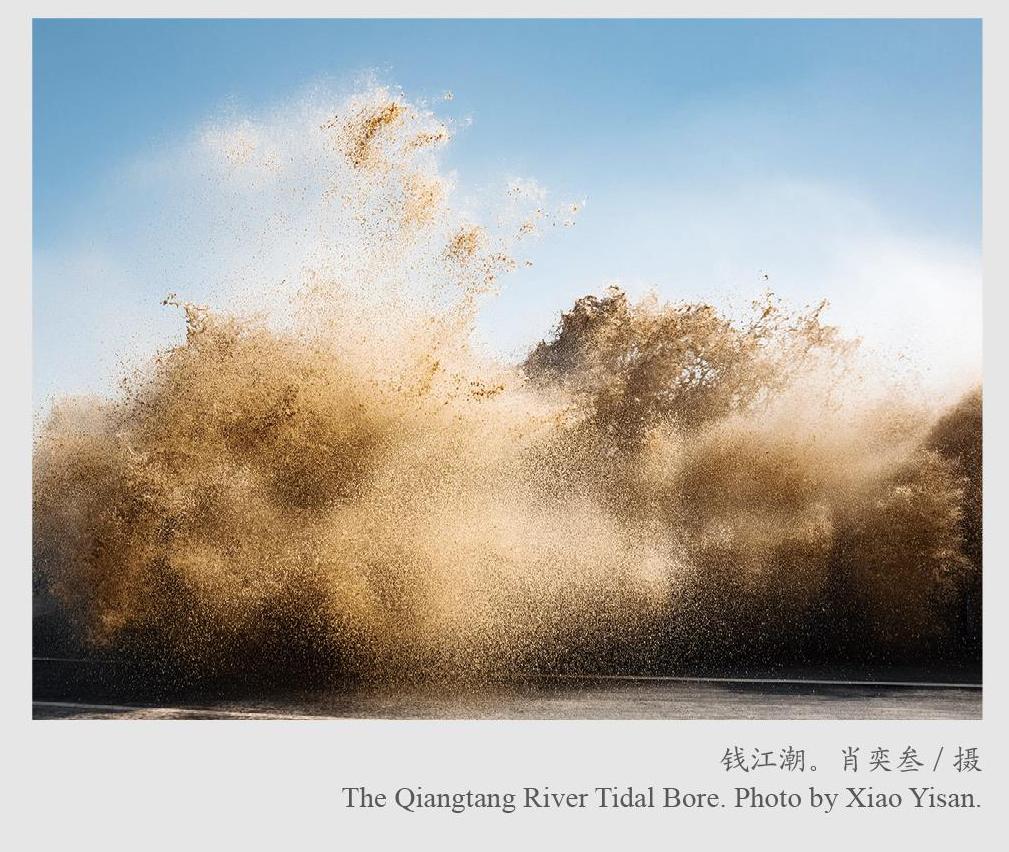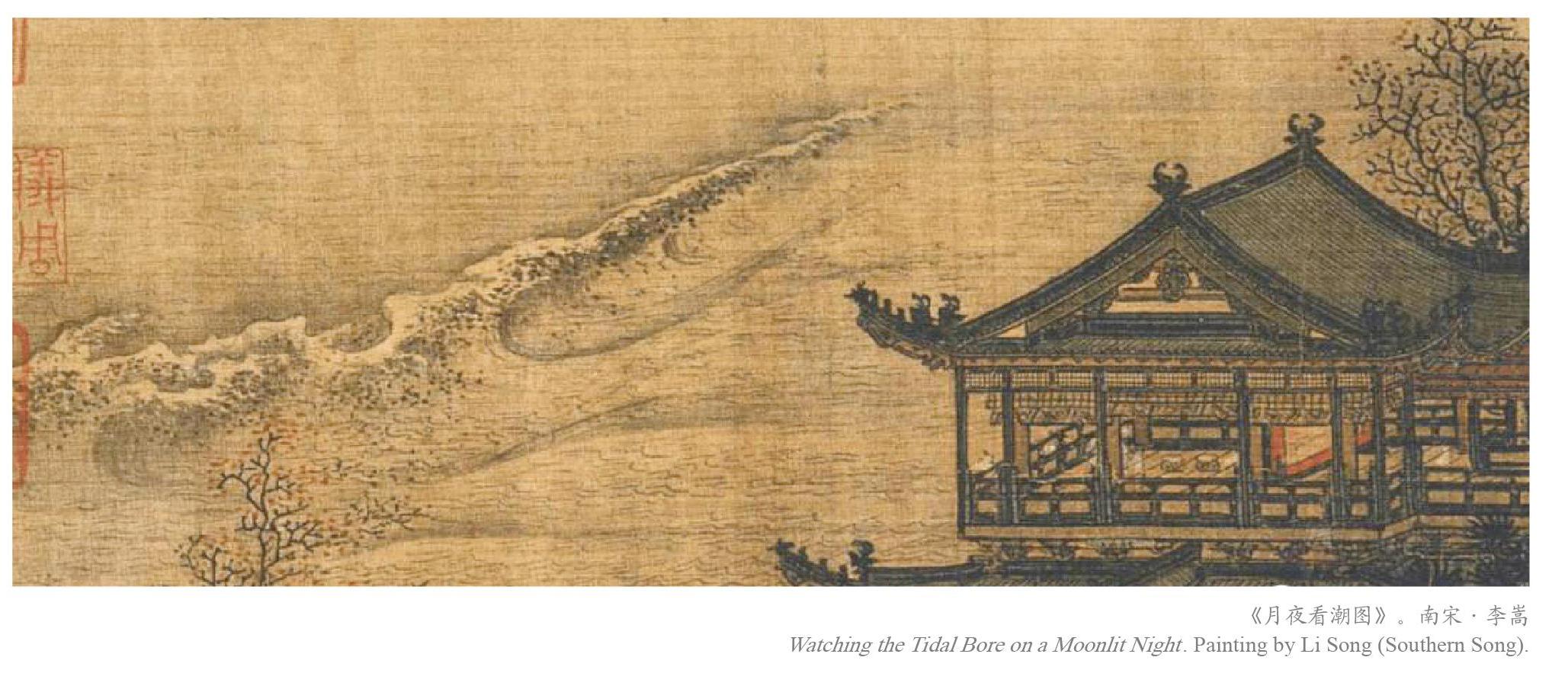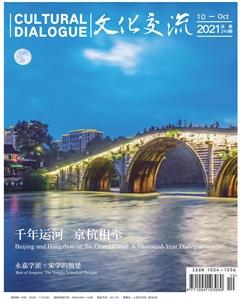苏东坡与观潮诗
司马一民


壮观钱江潮吸引了历代诗人观赏,因此也留下了很多观潮诗。古代诗人中谁写的观潮诗最多?大约要数苏东坡了。苏东坡曾经一口气连写五首观潮诗——《八月十五日看潮五绝》:
其一
定知玉兔十分圆,化作霜风九月寒。寄语重门休上钥,夜潮流向月中看。
其二
万人鼓噪慑吴侬,犹似浮江老阿童。欲识潮头高几许?越山浑在浪花中。
其三
江边身世两悠悠,久与沧波共白头。造物亦知人易老,故叫江水向西流。
其四
吴儿生长狎涛渊,冒利轻生不自怜。东海若知明主意,应教斥卤变桑田。
其五
江神河伯两醯鸡,海若东来气吐霓。安得夫差水犀手,三千强弩射潮低。
苏东坡在《乌台诗案》中说:“熙宁六年,任杭州通判,因八月十五日观潮作诗五首,写在安济亭上。”即《八月十五日看潮五绝》。可知这些诗词都作于宋神宗熙宁六年(1073年)中秋之日。第一首诗写诗人有出去看钱塘江潮的打算。第二首诗描绘了诗人看到的钱江潮气势磅礴。第三首诗抒写诗人看潮后兴起的感慨。第四首诗写诗人作为地方官,看潮的想法,诗人怜惜当时的弄潮人重利轻生,讽喻当时朝廷兴建的一些水利设施没有给百姓带来实惠。第五首诗写诗人想象倘若能得到当年夫差穿着水犀之甲的猛士,用上钱镠射潮的三千强弩,就可以把大潮制服,免于百姓受灾。这五首诗有虚有实,虚实结合,有描述有感慨有想象,反映了苏东坡常怀忧国忧民之心。
《瑞鹧鸪 · 观潮》是苏东坡写的一首观潮词:
碧山影里小红旗,侬是江南踏浪儿。拍手欲嘲山简醉,齐声争唱浪婆词。西兴渡口帆初落,渔浦山头日未欹。侬欲送潮歌底曲?尊前还唱使君诗。
踏浪儿,指冲浪者。山简,晋人,好酒。西兴渡口,在钱塘江南岸。使君,指杭州知州陈襄,当天他与苏东坡一同观潮。
此词大意为,那些在碧波中舞动着小红旗的勇士,你们是踏浪而舞的弄潮儿。我虽然喝酒的时候手舞足蹈,别笑我会像山简那样酩酊大醉,我正欣赏两岸观潮人唱的浪婆词。近处西兴渡口赛舟的帆刚刚落下,远方渔浦山头的太阳还没有西沉。你该唱哪一支曲送走潮水呢?我看对酒当歌陈太守作的诗最好。
这首词写了弄潮儿在浪涛中自由奔放,写了钱江潮退潮时候的景象,写了观潮者唱起“使君诗”作为送潮曲,可以说生动地描绘了当时杭州百姓生活习俗的一个历史画面。
苏东坡不光观赏江潮,还动脑筋“治潮”。元祐四年(1089),苏轼任杭州知州,他考察得知,衢、睦、处、婺、宣、歙、饶、信等州以及福建八州的人民往来时,都需在龙山附近渡江,但不少船被巨大的钱江潮水掀翻,“老弱叫号,求救于湍沙之间,声未及终,已为潮水卷去”,“能自全者,百无一二”,公私财物一年要损失几千万;沿江各州人民生活必需的盐、米、薪,也需借钱塘江运输,但浮山一带水势险恶,船只很难安全航行。苏东坡谋划治潮良策,在元祐六年(1091)从前信州知州侯临那儿访知,在钱塘江上游名叫石门的地方开凿一条运河,即可避开浮山之险。于是,他邀约转运司官员叶温叟、张璹一同前往石门一带实地考察,考察后一致认为侯临的设想是可行的。于是,他请侯临写了《开石门河利害事状》,请人做了开石门河所需的人工、材料、钱米等工程预算,又绘一幅施工图。同年三月,苏东坡上奏朝廷《乞相度开石门河状》,连同工程预算、施工图以及侯临的书状一并上报,请求宋哲宗和听政的太皇太后拨钱十五万贯、允许调用三千军人,用来开凿石门河,还建议朝廷派候临监督施工,计划用两年时间完成这一工程。做完了“工程立项”,元祐六年八月,苏东坡就调离杭州去颖州上任了。
苏东坡还有一首诗《观浙江涛》,开头两句被视为对钱江潮的最高评价:
八月十八潮,壮观天下无。鲲鹏水击三千里,组练长驱十万夫。红旗青盖互明末,黑沙白浪相吞屠。人生会合古难必,此情此景那两得。愿君闻此添蜡烛,门外白袍如立鹄。
对钱江潮的汹涌壮观,描述得别具一格,还夹有对世事人生的感慨,也是触景生情。
像白居易一样,钱江潮留在苏东坡心目中的印象极深,离开杭州很多年以后,晚年的苏东坡又写了一首观潮诗——《观潮》:
庐山烟雨浙江潮,未到千般恨不消。到得还来别无事,庐山烟雨浙江潮。
这首诗是宋徽宗建中靖国元年(1101年)苏东坡在常州写给小儿子苏过的,类似偈语,与他以前的诗,风格迥异。
这年苏过将去就任中山府通判,苏东坡写了此诗送他。此诗仅从字面解释是很简单的,但简单中又蕴含着不简单,颇有禅机。
这首诗大意为,庐山的烟雨和浙江潮,不去觀赏遗憾终身。终于亲临两地看到了烟雨蒙蒙的庐山和汹涌澎湃的浙江潮,却没有什么特别的感受,也不过就是烟雨蒙蒙的庐山和汹涌澎湃的浙江潮。
《五灯会元》卷十七载青原惟信禅师语录:“老僧三十年前未参禅时,见山是山,见水是水。及至后来,亲见知识,有个入处,见山不是山,见水不是水。而今得个休歇处,依前见山是山,见水是水。大众,这三般见解,是同是别?有人缁素得出,许汝亲见老僧。”
这“三般见解”,指禅悟的三个阶段,苏东坡这首诗,用的正是此意。在经历了人生道路上的潮起潮落,晚年苏东坡写此诗是否可以用“不过如此”来解释?也许他想告诉苏过的就是这个意思,别把官场起伏看得太重。
这首《观潮》在众多的观潮诗词中极为少见。
当年七月二十八日,苏东坡病死于常州。
(作者系杭州市政协智库专家、杭州文史专家)
Su Dongpos Five
Quatrains on Watching the Tidal Bore
By Sima Yimin
For generations and generations, Chinese poets have been fascinated by the spectacular tidal bores of the Qiantang River at the head of Hangzhou Bay. Naturally, many poems on tide watching have been written. Among the poets of yore, who penned the most poems on this subject? Su Shi (1037-1101), aka Su Dongpo, preeminent scholar of the Song dynasty (960-1279) and one of Chinas greatest poets, is definitely one of the best candidates.
In fact, Su once composed five poems in one go, titled “Watching the Tidal Bore on the Fifteenth Day of the Eighth Lunar Month, Five Quatrains”:
One
Knowing the “Jade Rabbit” is round tonight, Im already feeling the colder autumn brought by frosty winds.
Praying to heaven not to lock its gate, Ill savor the tides rushing under the moonlight.
Two
As if thousands beating the drum the tides roar,
scaring the Wu people like Wang Jun the Jin general of yore.
How high can the crest of the waves soar?
Even the Yue mountains are buried beneath all.
Three
Like the river my life ebbs and flows,
Long have I aged, as white as the waves my hair grows.
Even the Creator knows we easily get old,
So He turned back the river, telling it to flow to the west.
Four
Living by riverside, the Wu people are so fond of surging billows,
That they unduly risk their lives riding waves.
If the God of Sea can see through the emperors mind,
He should turn the saline soil into fertile land.
Five
The water fairy and the river spirit are but two small fries,
Only the God of Sea brings from the east rainbow-swallowing bores.
Where can I find King Fuchais rhino-skinned warriors?
Three thousand crossbowmen will shoot down the waves.
“During the sixth year of the reign of Xining, I served as the assistant prefect of Hangzhou. Watching the tidal bore on the fifteenth day of the eighth lunar month, I composed five poems at the Anji Pavilion,” Su Shi wrote in an essay. It shows that these quatrains were done on the Mid-Autumn Day in the year 1073. Here, each of the five quatrains has a different theme. The first: raring to watch the tidal bore. The second: enjoying the spectacular view. The third: feelings after watching the tidal bore. The fourth: thoughts and reflections on the precarious life of the local watermen and the benefits that public water conservancy facilities failed to bring. The fifth: imagining himself obtaining rhino-skin-armored warriors of Fuchai (?-473 BC), king of Wu, and the three-thousand-strong crossbowmen that Qian Liu (852-932 AD), king of Wuyue, deployed to tame the tide.
True to the sentiments he expressed in the poesm, Su Dongpo did more than enjoy the river tides; he spent a lot of efforts managing tides. In 1089, the fourth year of the reign of Yuanyou, Su was appointed prefect of Hangzhou. After some investigative work, he found that people from a number of prefectures in Zhejiang, Anhui, Jiangxi and Fujian provinces had to cross the Qiantang River at a pass near Fushan Mountain for personal visits and commercial exchanges, but many a boat had been overturned by the tides. “The old and the infirm called out loud for help amid the rapids, but they were overtaken by the tides even before their voices died out”, “no more than one or two out of a hundred could emerge unscathed”, and damages worth tens of millions were caused to public and personal properties. Indeed, daily necessities like salt, rice and firewood were also transported via the Qiantang River, and the safety of transport ships were greatly endangered near Fushan Mountain. In 1091, after learning that the dangers along Fushan Mountain stretch could be avoided by digging a canal along the upper reaches of the river, Su not only went on a field trip, but drew up a working plan and budget for the project, before submitting a memorial to the imperial court, pleading for 150,000 taels of silver as project funding and 3,000 soldiers as labor. The canal was planned to be finished in two years. However, Su was transferred to Yingzhou (present-day Fuyang city in Anhui province) in June before the project could be completed.
Apart from the five quatrains, Su wrote a number of other poems on watching the tidal bore as well. In “To the Tune of Auspicious Partridge: Watching the Tidal Bore”, a Ci poem, he wrote of the local peoples tradition of singing a song to celebrate Qiantang Rivers receding tide. He began the poem “Watching the Zhejiang Waves” by stating “the tidal bores on the eighteenth day of the eighth lunar month, are the most spectacular of all”, which is often regarded as the highest compliment to the Qiantang River tidal bore.
The tidal bore left such an indelible mark on Su, that many years after he left Hangzhou, he composed yet another poem simply titled “Watching the Tidal Bore” in the year 1101. This time, he asked his reader, his youngest son, to see through the trappings of the mortal world, for “at the end of the day…the breathtaking Zhejiang tidal bore is no more than the breathtaking Zhejiang tidal bore”.
Later in the same year, on the twenty-eighth day of the seventh lunar month (August 24th), Su Dongpo died of illness in Changzhou city, Jiangsu province.

